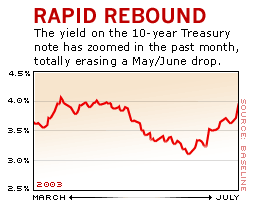NEW YORK (CNN/Money) - The recent rise in interest rates has been sudden and dramatic, but not quite enough to sink the U.S. economy, economists said Wednesday.
After hitting a record low near 3 percent in mid-June, the yield -- or interest rate -- on the 10-year Treasury note has jumped nearly a full percentage point to about 4 percent Wednesday.
Since the rate on the 10-year note is so closely tied to 30-year mortgage rates, the rise cannot be good news for the housing market, which has supported the nation's struggling economy for much of the past year.

"The thing that helped the economy so much was a drop in interest rates, which meant lower mortgage rates, which meant consumers have been able to tap the wealth in their homes by refinancing and taking equity out of their homes," said Rory Robertson, interest-rate strategist at Macquarie Equities (USA). "With rates having backed up so sharply, refinancing is not such a bargain any more."
But Robertson and other economists said they doubted the rise in long-term bond rates would be enough to sink the economy and, in fact, could be a sign of better things to come.
"There may be somebody else taking the baton now, which is not unusual in a recovery," said Northern Trust chief U.S. economist Paul Kasriel. "Housing is typically the leader out of the desert to the promised land; but, just like Moses didn't make it to the promised land, as rates rise, housing doesn't quite make it, either. Other sectors do."
Kasriel is not necessarily optimistic about the long-term prospects for the economy, thinking low rates could be puffing up another dangerous bubble in stock prices. The popping of the last bubble, at the end of the 1990s, helped fuel the recession of 2001.
But Kasriel and other economists believe that, in the short term at least, the recent run-up in stock prices has likely offset the negative effects of higher interest rates to some extent, by making consumers feel wealthier and encouraging their spending, which fuels more than two-thirds of the economy.
"Even though the rising pattern in borrowing costs is a form of restraint, it is being offset by a surge in equity wealth as the stock market records consistent gains," Morgan Stanley senior economist Bill Sullivan said in a note to clients Tuesday.
Appearing on CNNfn Wednesday morning, Sullivan added he thought there was a strong chance interest rates could go lower again, particularly if it turns out that economists' estimates of much stronger economic growth in the second half were too optimistic.
In fact, it's even possible that the consensus forecast won't have to be very wrong to keep bond prices relatively high and interest rates relatively low.
"3.5 percent GDP growth doesn't produce much in the way of employment growth," said Robertson of Macquarie Equities. "The thing to signal the time to sell Treasury bonds in a big way is when jobs growth comes back, and I don't think the job-growth story in the second half will be strong enough to smash the Treasury market."
Economists on average are forecasting 3.6 percent growth in gross domestic product for the third quarter and 3.8 percent for the fourth quarter, according to the latest Blue Chip survey of economists. GDP is the broadest measure of the nation's economy.

|

